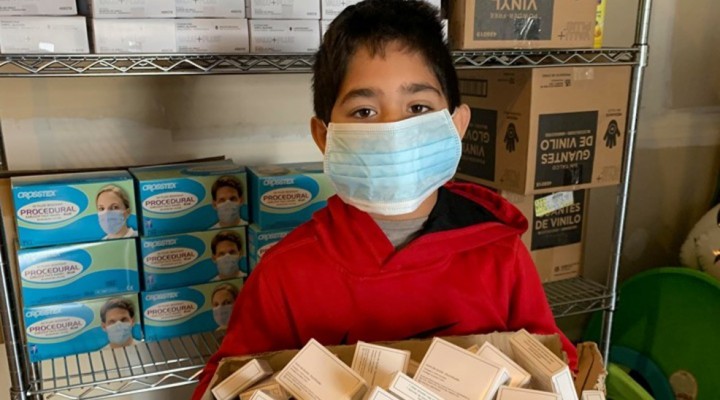Children Risking Their Lives. How Cute!

Coronavirus crisis provides a surfeit of horrific ‘uplifting’ news
If you really want to understand the ideology corporate media are constantly selling us, it’s often best not to look at how they cover serious news, but what they depict as light-hearted human interest stories. There’s always a stream of them from local and national outlets, designed to pique interest and serve as a balance to the often heavier headline content. Stories along the lines of “Homeless Man Wins Lottery” or “Local Sisters Accepted to Harvard AND Yale” abound, often appearing at the ends of news broadcasts.
FAIR (8/3/17, 3/25/19, 7/21/19) has already catalogued how corporate media are so out of touch that much of what they present as heartwarming human interest pieces are actually unintentionally horrifying revelations of the deep dysfunctions in US society—tales of late-capitalist dystopia repackaged as feel-good stories. During an epochal catastrophe such as this one, where bodies are piling up outside morgues and tens of millions have lost their jobs, corporate media’s neoliberal understanding of what is uplifting stretches credulity to the breaking point.

CNN (4/30/20) reported on a teacher who used half his stimulus check to pay for utilities for the families of three students, which “should cover their bills for a little more than two months.”
A case in point is CNN’s account (4/30/20) of an Alabama school teacher paying his desperate students’ utility bills with his stimulus money. This was presented as a heartening story; indeed, one radio show introduced it with the title “Good News.” But is it? Certainly the teacher’s actions are admirable. But the context within which they occurred sounds more like the death rattle of a terminally ill society.
Why do children even have these bills? Would they have had their water and electricity cut off during a pandemic if not for the actions of a public school teacher, himself hardly likely to be a font of wealth? Couldn’t the US do what other countries have done, and suspend bills during the crisis? CNN asked none of these questions (nor any others), implicitly normalizing the situation, suggesting these details are unimportant or unremarkable.
The kids are all right
Children taking on the responsibilities of adults is a common theme of questionable feel-good stories, and during the coronavirus pandemic it is no different. CNN (4/5/20), for example, shared the story of Cavanaugh Bell, a Maryland boy who used his $600 life savings to buy and deliver groceries for his grandmother and other at-risk members of the community. But it did not ask whether government could be funding this, or simply doing it themselves, rather than leaving it to a seven-year-old child.

ABC (4/3/20) reported that people around the world found that the story of a seven-year-old going out into a pandemic to gather critical medical supplies “brought a smile to their faces during this difficult time.”
Likewise, the story of Zohaib Begg, a seven-year-old Virginian who began collecting personal protective gear (like gloves and shower caps) from hotels to donate them to equipment-starved local hospitals delighted media (e.g., Patch, 3/27/20; ABC News, 4/3/20), along with former President Barack Obama, who shared his story on Twitter (3/30/20).
Why were hospitals already critically short of supplies by March 27? Why weren’t authorities buying them en masse online, where they are still freely available to this day? And is “inspirational” really the word to describe a child with an immuno-compromised sister stepping in to perform the most basic functions of the government? Media did not ask, preferring to paper over the rapidly widening cracks in society with bland feel-good rhetoric where it was scarcely appropriate.
Judging from the comments to Obama’s post, readers saw the story as less uplifting and more a shocking indictment of the state of the country. Some of the most prominent replies included: “Maybe a previous administration should have built a system where seven-year-olds didn’t have to fill the gaps left by the government,” “That is not inspiring” and “How can you look at a child having to supply hospitals with needed equipment and not realize we live in a failed state?”
At a time of intense uncertainty, there is an understandable need for messages of hope. Unfortunately, much of the media is unable to provide it, chiefly because they are stuck in a neoliberal conception of how the world should run, seeing things like healthcare, food and housing not as inalienable rights (enshrined in the UN Universal Declaration of Human Rights), but merely as commodities to be bought and sold in the marketplace, as if they were iPhones or perfume. Thus, starving grandparents and kids without electricity or water are not outrages, but unfortunate facts of life that can be overcome by an application of grit.
While the actions of those profiled are indeed heroic, only the truest of believers in the free market can find their perseverance inspiring without being troubled by the awful context around them. As the neoliberal order rapidly decays before our eyes, the contradictions become clearer, and many of the “uplifting” human interest pieces corporate media share only serve to highlight the inhuman logic the system promotes.
 TheAltWorld
TheAltWorld 
0 thoughts on “Children Risking Their Lives. How Cute!”